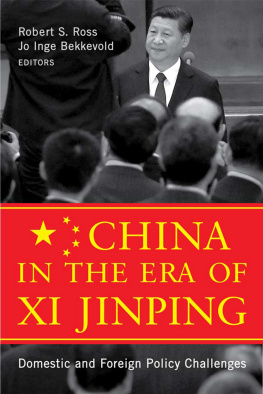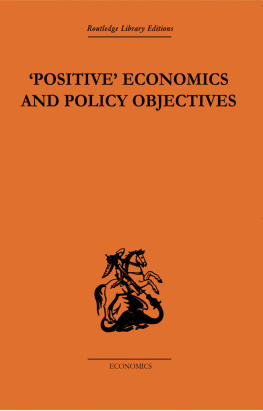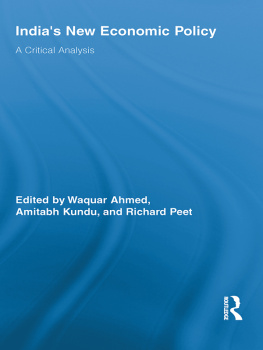About the Author
Hua-yu Li grew up in Beijing and attended Sophia University in Tokyo, Japan. She received a masters degree in regional studiesEast Asia from Harvard University and a Ph.D. in comparative politics from Columbia University. Li is currently associate professor in the Department of Political Science at Oregon State University. Her new book project focuses on the impact of Stalinism on Chinas political and ideological transformation under Mao, and on the continued influence of Stalinism in China today.
M A O A N D T H E E C O N O M I C S T A L I N I Z A T I O N O F C H I N A , 1 9 4 8 1 9 5 3
The Harvard Cold War Studies Book Series
Series Editor
Mark Kramer, Harvard University
Resistance with the People: Repression and Resistance in Eastern Germany, 19451955
Gary Bruce
Triggering Communism's Collapse: Perceptions and Power in Poland's Transition
Marjorie Castle
Redrawing Nations: Ethnic Cleansing in East-Central Europe, 19441948
Edited by Philipp Ther and Ana Siljak
Mao and the Economic Stalinization of China, 19481953
Hua-yu Li
ROWMAN & LITTLEFIELD PUBLISHERS, INC.
Published in the United States of America
by Rowman & Littlefield Publishers, Inc.
A wholly owned subsidiary of The Rowman & Littlefield Publishing Group, Inc.
4501 Forbes Boulevard, Suite 200, Lanham, Maryland 20706
www.rowmanlittlefield.com
P.O. Box 317, Oxford OX2 9RU, UK
Copyright 2006 by Rowman & Littlefield Publishers, Inc.
All rights reserved. No part of this publication may be reproduced, stored in a retrieval system, or transmitted in any form or by any means, electronic, mechanical, photocopying, recording, or otherwise, without the prior permission of the publisher.
British Library Cataloguing in Publication Information Available
Library of Congress Cataloging-in-Publication Data
Li, Hua-yu
Mao and the economic Stalinization of China, 19481953 / Hua-yu Li.
p. cm. (The Harvard Cold War studies book series)
Includes bibliographical references and index.
ISBN-13: 978-0-7425-4053-8 (cloth : alk. paper)
ISBN-10: 0-7425-4053-7 (cloth : alk. paper)
1. ChinaEconomic policy19121949. 2. ChinaEconomic policy19491976. 3. Mao, Zedong, 18931976Philosophy. 4. Marxian economics. 5. Stalin, Joseph, 18791953Influence. I. Title. II. Series.
HC427.8.L475 2006
330.951'055dc22 2005024181
Printed in the United States of America
 The paper used in this publication meets the minimum requirements of American National Standard for Information SciencesPermanence of Paper for Printed Library Materials, ANSI/NISO Z39.48-1992.
The paper used in this publication meets the minimum requirements of American National Standard for Information SciencesPermanence of Paper for Printed Library Materials, ANSI/NISO Z39.48-1992.
To my late father Li Shaopeng
To my mother Fujita Emi
Abbreviations for Frequently Cited Journals
| AJCA | Australian Journal of Chinese Affairs |
| BNC | Bainianchao [A tide of a hundred years] |
| CQ | China Quarterly |
| Bulletin | Cold War International History Project Bulletin |
| DW | Dangde wenxian [Party documents] |
| DYZ | Dangshi yanjiu ziliao [Party history research materials] |
| DY | Dangshi yanjiu [Party history research] |
| FEA | Far Eastern Affairs |
| JCWS | Journal of Cold War Studies |
| NC | Neibu cankao [Internal reference] |
| XX | Xuexi [Study] |
| ZDY | Zhonggong dangshi yanjiu [CCP party history research] |
| ZDZ | Zhonggong dangshi ziliao [CCP party history materials] |
Acknowledgments
C OMPLETING THIS BOOK HAS BEEN A LONG PROCESS , and I am grateful for the support I received from mentors, the scholarly community, friends, and loved ones. My mentors, Professors Thomas P. Bernstein and Andrew J. Nathan, directed my dissertation research and writing and continued to be helpful as I revised my dissertation and turned it into a publishable book. With his keen eye for detail and knowledge of Soviet history and politics, Professor Bernstein read the entire book manuscript and made important comments for changes. I am lucky to have two great scholars as my mentors and appreciate their support and encouragement, and I owe each of them a tremendous intellectual debt.
I have also benefited from discussions with various scholars. I am especially grateful to the late Professors Benjamin I. Schwartz and Adam Ulam, and to Professors Stuart Schram, Janos Konai, Jean C. Oi, Andrew Walder, William C. Kirby, Richard Kraus, and Linda Grove for their knowledge and wisdom. Professor Elizabeth J. Perry offered valuable suggestions at the early stages of the project, and Professor Robert S. Ross generously shared with me his collection of Chinese materials. Dr. Balazs Szalontai, a Hungarian scholar, read the entire book manuscript and, drawing upon his intimate familiarity with Eastern European history and politics, made valuable suggestions for changes. I appreciate his humor and friendship. I am also thankful for the constructive comments made by outside reviewers.
Special thanks go to scholars and friends in China for their insights and generosity. Lin Yunhui provided special help and opened many doors for me. I have also received help from other scholars: Li Haiwen, Li Danhui, the late Li Shenzhi, Shen Zhihua, Yang Kuisong, Xie Chuntao, and Zhao Baoxu. I would like to express my thanks for the many others in China who helped me but have chosen to remain nameless. My old friend Zang Jian has been an important source of support. She and her husband, Pan Qingde, always made my stay at Beida as comfortable and rewarding as possible, and I deeply appreciate their help and friendship.
I would like to express my appreciation to three senior colleagues at Oregon State University, where I began my teaching career in 1996. Professors Lisa Ede and Erlinda Gonzales-Berry and Dean Kay F. Schaffer, each in her own way, gave me moral support during the writing process. I am grateful for their kindness, encouragement, and wisdom.
While writing the book, I benefited from the support of several institutions. A summer travel grant from the Stanford University East Asia National Resource Center in 1998 made it possible for me to use the Hoover Library. Three Valley Library Travel Grants from Oregon State Universityin 1997, 1999, and 2002enabled me to travel to Beijing and Hong Kong to conduct library research. While on leave in 20002001, Professor Dali L. Yang kindly sponsored me as an associate member of the Center for East Asian Studies at the University of Chicago. I was able not only to have access to the East Asian collection at the university library, but also to participate in the activities of the Center. A somewhat different version of chapter 3 was published by Russian History/Histoire Russe as a journal article, and the journal has kindly given me permission to publish it as part of the book.
It has been wonderful working with Dr. Mark Kramer, the series editor for this book. With his extensive knowledge of the world Communist system, Stalin, Mao, and their relationship, he has been an important source of ideas relating to my research and of suggestions for improvements in the manuscript. I very much appreciate all the support he has given me throughout the process of writing this book.
My thanks also go to several individuals at Rowman & Littlefield: April Leo in editorial production; Jessica Gribble, the associate editor; and Matt Evans, the copyeditor. April and Jessica helped me through the production process and always responded to my queries promptly. Matt went through the entire book manuscript carefully with a keen editorial eye.







 The paper used in this publication meets the minimum requirements of American National Standard for Information SciencesPermanence of Paper for Printed Library Materials, ANSI/NISO Z39.48-1992.
The paper used in this publication meets the minimum requirements of American National Standard for Information SciencesPermanence of Paper for Printed Library Materials, ANSI/NISO Z39.48-1992.